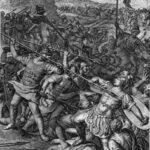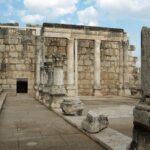One of the most most difficult things to understand about the exodus story is why, over the entire course of his struggle with Pharaoh, Moshe maintains the fiction that the Hebrews want to go three days into the wilderness into order to celebrate a festival to HASHEM. Since we know from the beginning that the plan is to leave Egypt permanently in order to conquer the Land of Israel, Moshe would appear to be engaging in deception. The most immediately obvious way of reading this is that the invention of a festival in the wilderness is intended to trick Pharaoh into letting the children of Israel leave on a temporary basis thus allowing them, when he agrees to this demand, to leg it.
This throws up an obvious moral quandary: isn’t it wrong to lie? And, even if we can answer this by justifying dishonesty on certain types of occasions and towards certain types of person, there’s an additional theological problem. The exodus is G-d’s first large scale intervention in human history. If, amidst all the miraculous plagues and in the course of delivering His people from bondage, G-d resorts to lying to get the job done, doesn’t that kind of ruin it? Isn’t it, for want of a better word, well, cheap?
However, there’s an even bigger problem with viewing the wilderness festival motif as a trick, which is that G-d makes clear right from the beginning that the trick isn’t actually supposed to work (Shemot 3:18-20):
וְשָׁמְעוּ לְקֹלֶךָ וּבָאתָ אַתָּה וְזִקְנֵי יִשְׂרָאֵל אֶל־מֶלֶךְ מִצְרַיִם וַאֲמַרְתֶּם אֵלָיו יְהוָה אֱלֹהֵי הָעִבְרִיִּים נִקְרָה עָלֵינוּ וְעַתָּה נֵלֲכָה־נָּא דֶּרֶךְ שְׁלֹשֶׁת יָמִים בַּמִּדְבָּר וְנִזְבְּחָה לַיהוָה אֱלֹהֵינוּ׃ וַאֲנִי יָדַעְתִּי כִּי לֹא־יִתֵּן אֶתְכֶם מֶלֶךְ מִצְרַיִם לַהֲלֹךְ וְלֹא בְּיָד חֲזָקָה׃ וְשָׁלַחְתִּי אֶת־יָדִי וְהִכֵּיתִי אֶת־מִצְרַיִם בְּכֹל נִפְלְאֹתַי אֲשֶׁר אֶעֱשֶׂה בְּקִרְבּוֹ וְאַחֲרֵי־כֵן יְשַׁלַּח אֶתְכֶם׃
G-d not only knows that Pharaoh will not accede to the request, G-d doesn’t even want him to, since that would remove the pretext for visiting His plagues upon Egypt. If, then, Pharaoh’s refusal to submit is in itself part of the plan, why try to ‘trick’ him by asking for less than the whole hog? The tactic of asking to be allowed to travel three days into the wilderness would seem to introduce all the moral and theological problems associated with deception to no practical purpose whatsoever.
Ibn Ezra and Ran try to solve the problem by arguing that the purpose of the deception was something different. The culmination of G-d’s revelation during the exodus was the splitting of the Reed Sea and the drowning of the Egyptians. Had Pharaoh not previously been under the impression that the Hebrews would return after three days, he would not have, upon hearing otherwise, gathered up an army to pursue them and the story would not have been brought to its culmination.
I suspect that for most modern readers, such an interpretation makes the moral problems involved more acute rather than less. Be that as it may, however, it is worth looking at whether this interpretation is really supported by text.
Ibn Ezra and Ran’s understanding of the purpose of deceiving Pharaoh is based upon a traditional understanding of Shemot 14:5, on which Rashi, loosely based on Mechilta, writes:
וַיֻּגַּד לְמֶלֶךְ מִצְרַיִם כִּי בָרַח הָעָם וַיֵּהָפֵךְ לְבַב פַּרְעֹה וַעֲבָדָיו אֶל־הָעָם וַיֹּאמרוּ מַה־זֹּאת עָשִׂינוּ כִּי־שִׁלַּחְנוּ אֶת־יִשְׂרָאֵל מֵעָבְדֵנוּ׃
ויגד למלך מצרים. איקטורין שלח עמהם, וכיון שהגיעו לשלשת ימים שקבעו לילך ולשוב וראו שאינן חוזרין למצרים, באו והגידו לפרעה ביום הרביעי, בחמישי ובששי רדפו אחריהם, ליל שביעי ירדו לים, בשחרית אמרו שירה והוא יום שביעי של פסח; לכך אנו קורין השירה ביום השביעי:
According to this, Pharaoh waited three days for the Hebrews to have their festival in the wilderness after which ‘it was told to the King of Egypt’ that they weren’t coming back. Pharaoh gets the news on day four and catches up on the evening of the seventh. The splitting of the sea happens the following morning, which is why we read shirat hayam on shevi’i shel Pesah (a custom which goes back, at least, to the fourth generation of amoraim and is almost certainly based on this interpretation).
The idea that the splitting of the sea happened on the seventh day after leaving Egypt is quite reasonable, but, in fact, the earliest source for this idea, Seder Olam Rabah, does not link the six day interval to the supposed three day festival in the wilderness, but rather infers it from the distance the children of Israel had to travel before reaching Eitam. Rashi’s explanation is based upon the words ‘that the people had fled’, interpreting this as meaning that up until that point Pharaoh thought they were coming back. However, if we look at the preceding verses, it becomes clear that this is not the reason that ‘the heart of Pharaoh and his servants was overturned’:
וַיְדַבֵּר יְהֹוָה אֶל־מֹשֶׁה לֵּאמֹר׃ דַּבֵּר אֶל־בְּנֵי יִשְׂרָאֵל וְיָשֻׁבוּ וְיַחֲנוּ לִפְנֵי פִּי הַחִירֹת בֵּין מִגְדֹּל וּבֵין הַיָּם לִפְנֵי בַּעַל צְפֹן נִכְחוֹ תַחֲנוּ עַל־הַיָּם׃ וְאָמַר פַּרְעֹה לִבְנֵי יִשְׂרָאֵל נְבֻכִים הֵם בָּאָרֶץ סָגַר עֲלֵיהֶם הַמִּדְבָּר׃ וְחִזַּקְתִּי אֶת־לֵב־פַּרְעֹה וְרָדַף אַחֲרֵיהֶם וְאִכָּבְדָה בְּפַרְעֹה וּבְכָל־חֵילוֹ וְיָדְעוּ מִצְרַיִם כִּי־אֲנִי יְהוָה וַיַּעֲשׂוּ־כֵן׃
G-d predicts that Pharaoh will pursue the children of Israel, not as a result of realizing he has been deceived, but because he will be misled into thinking that they have become lost in the wilderness. Rather than being angered by the knowledge that the children of Israel are on their way to the land of Israel, Pharoah will become emboldened by the (apparent) knowledge that they are not travelling to their home, but have turned back. The conclusion of verse 5 ‘what is this that we have done that we have sent the children of Israel from serving us’ is read most naturally, both on its own and in the context of the whole passage, not as an expression of surprise that the Hebrews have not returned as expected, but as an expression of regret at the decision to send them away.
So, the interpretation according to which the festival in the wilderness was a fiction designed to entice Pharaoh into pursuing the children of Israel does not appear to be firmly grounded in the p’shat. I believe that a more compelling interpretation emerges once we look at one of the most important themes of the exodus story.
Consider the following verses:
וַיֹּאמֶר מֹשֶׁה אֶל־הָאֱלֹהִים הִנֵּה אָנֹכִי בָא אֶל־בְּנֵי יִשְׂרָאֵל וְאָמַרְתִּי לָהֶם אֱלֹהֵי אֲבוֹתֵיכֶם שְׁלָחַנִי אֲלֵיכֶם וְאָמְרוּ־לִי מַה־שְּׁמוֹ מָה אֹמַר אֲלֵהֶם׃ וַיֹּאמֶר אֱלֹהִים אֶל־מֹשֶׁה אֶהְיֶה אֲשֶׁר אֶהְיֶה וַיֹּאמֶר כֹּה תֹאמַר לִבְנֵי יִשְׂרָאֵל אֶהְיֶה שְׁלָחַנִי אֲלֵיכֶם׃ וַיֹּאמֶר עוֹד אֱלֹהִים אֶל־מֹשֶׁה כֹּה־תֹאמַר אֶל־בְּנֵי יִשְׂרָאֵל יְהוָה אֱלֹהֵי אֲבֹתֵיכֶם אֱלֹהֵי אַבְרָהָם אֱלֹהֵי יִצְחָק וֵאלֹהֵי יַעֲקֹב שְׁלָחַנִי אֲלֵיכֶם זֶה־שְּׁמִי לְעֹלָם וְזֶה זִכְרִי לְדֹר דֹּר׃
וְאַחַר בָּאוּ מֹשֶׁה וְאַהֲרֹן וַיֹּאמְרוּ אֶל־פַּרְעֹה כֹּה־אָמַר יְהוָה אֱלֹהֵי יִשְׂרָאֵל שַׁלַּח אֶת־עַמִּי וְיָחֹגּוּ לִי בַּמִּדְבָּר׃ וַיֹּאמֶר פַּרְעֹה מִי יְהוָה אֲשֶׁר אֶשְׁמַע בְּקֹלוֹ לְשַׁלַּח אֶת־יִשְׂרָאֵל לֹא יָדַעְתִּי אֶת־יְהוָה וְגַם אֶת־יִשְׂרָאֵל לֹא אֲשַׁלֵּחַ׃
וַיְדַבֵּר אֱלֹהִים אֶל־מֹשֶׁה וַיֹּאמֶר אֵלָיו אֲנִי יְהוָה׃ וָאֵרָא אֶל־אַבְרָהָם אֶל־יִצְחָק וְאֶל־יַעֲקֹב בְּאֵל שַׁדָּי וּשְׁמִי יְהוָה לֹא נוֹדַעְתִּי לָהֶם׃ וְגַם הֲקִמֹתִי אֶת־בְּרִיתִי אִתָּם לָתֵת לָהֶם אֶת־אֶרֶץ כְּנָעַן אֵת אֶרֶץ מְגֻרֵיהֶם אֲשֶׁר־גָּרוּ בָהּ׃ וְגַם אֲנִי שָׁמַעְתִּי אֶת־נַאֲקַת בְּנֵי יִשְׂרָאֵל אֲשֶׁר מִצְרַיִם מַעֲבִדִים אֹתָם וָאֶזְכֹּר אֶת־בְּרִיתִי׃ לָכֵן אֱמֹר לִבְנֵי־יִשְׂרָאֵל אֲנִי יְהוָה וְהוֹצֵאתִי אֶתְכֶם מִתַּחַת סִבְלֹת מִצְרַיִם וְהִצַּלְתִּי אֶתְכֶם מֵעֲבֹדָתָם וְגָאַלְתִּי אֶתְכֶם בִּזְרוֹעַ נְטוּיָה וּבִשְׁפָטִים גְּדֹלִים׃ וְלָקַחְתִּי אֶתְכֶם לִי לְעָם וְהָיִיתִי לָכֶם לֵאלֹהִים וִידַעְתֶּם כִּי אֲנִי יְהוָה אֱלֹהֵיכֶם הַמּוֹצִיא אֶתְכֶם מִתַּחַת סִבְלוֹת מִצְרָיִם׃
וַיִּשְׁלַח פַּרְעֹה וַיִּקְרָא לְמֹשֶׁה וּלְאַהֲרֹן וַיֹּאמֶר אֲלֵהֶם חָטָאתִי הַפָּעַם יְהוָה הַצַּדִּיק וַאֲנִי וְעַמִּי הָרְשָׁעִים׃
וַיָּקָם פַּרְעֹה לַיְלָה הוּא וְכָל־עֲבָדָיו וְכָל־מִצְרַיִם וַתְּהִי צְעָקָה גְדֹלָה בְּמִצְרָיִם כִּי־אֵין בַּיִת אֲשֶׁר אֵין־שָׁם מֵת׃ וַיִּקְרָא לְמֹשֶׁה וּלְאַהֲרֹן לַיְלָה וַיֹּאמֶר קוּמוּ צְּאוּ מִתּוֹךְ עַמִּי גַּם־אַתֶּם גַּם־בְּנֵי יִשְׂרָאֵל וּלְכוּ עִבְדוּ אֶת־יְהוָה כְּדַבֶּרְכֶם׃ גַּם־צֹאנְכֶם גַּם־בְּקַרְכֶם קְחוּ כַּאֲשֶׁר דִּבַּרְתֶּם וָלֵכוּ וּבֵרַכְתֶּם גַּם־אֹתִי׃
וַיַּרְא יִשְׂרָאֵל אֶת־הַיָּד הַגְּדֹלָה אֲשֶׁר עָשָׂה יְהוָה בְּמִצְרַיִם וַיִּירְאוּ הָעָם אֶת־יְהוָה וַיַּאֲמִינוּ בַּיהוָה וּבְמֹשֶׁה עַבְדּוֹ׃
Clearly, the exodus was not just about liberating the children of Israel from Egypt, but also the manifestation of G-d, specifically known by the tetragrammaton name, as the supreme lord of the world. It is important to note, however, that it is not only, and not even primarily, to the children of Israel that this giluy shechinah happens. The Hebrews believe in HASHEM the first time they are informed about Him and, though their faith fails, they offer no resistance and wait passively as they are guided back to full belief again when witnessing the victory at the Reed Sea.
The struggle, however, to assert the supremacy of HASHEM, however, takes place entirely with one man: Pharaoh. It is he who announces triumphantly in his first meeting with Moshe that he ‘does not know HASHEM‘ and it is he who after refusing to submit after each of the first nine plagues bids Moshe leave with the pathetic request that when worshiping HASHEM they make sure to bless him too.
This struggle between G-d and Pharaoh must be understood in terms of the unique approach that prophets took to Egyptian religion. Any student of Tanakh will be familiar with the names of ancient middle-eastern deities like Ba’al, Asherah, Cemosh, Molech or Dagon, but not once do any of the biblical books mention Ra, Osiris, Isis, Anubis, Seth, Horus or any of the other Egyptian deities so well known to us from other sources. Instead, the prophets focus exclusively on the way the Egyptians elevated Pharaoh to the status of man-god:
בַּשָּׁנָה הָעֲשִׂירִית בָּעֲשִׂרִי בִּשְׁנֵים עָשָׂר לַחֹדֶשׁ הָיָה דְבַר־יְהוָה אֵלַי לֵאמֹר׃ בֶּן־אָדָם שִׂים פָּנֶיךָ עַל־פַּרְעֹה מֶלֶךְ מִצְרָיִם וְהִנָּבֵא עָלָיו וְעַל־מִצְרַיִם כֻּלָּהּ׃ דַּבֵּר וְאָמַרְתָּ כֹּה־אָמַר אֲדֹנָי יְהוִה הִנְנִי עָלֶיךָ פַּרְעֹה מֶלֶךְ־מִצְרַיִם הַתַּנִּים הַגָּדוֹל הָרֹבֵץ בְּתוֹךְ יְאֹרָיו אֲשֶׁר אָמַר לִי יְאֹרִי וַאֲנִי עֲשִׂיתִנִי׃ וְנָתַתִּי חחיים [חַחִים] בִּלְחָיֶיךָ וְהִדְבַּקְתִּי דְגַת־יְאֹרֶיךָ בְּקַשְׂקְשֹׂתֶיךָ וְהַעֲלִיתִיךָ מִתּוֹךְ יְאֹרֶיךָ וְאֵת כָּל־דְּגַת יְאֹרֶיךָ בְּקַשְׂקְשֹׂתֶיךָ תִּדְבָּק׃ וּנְטַשְׁתִּיךָ הַמִּדְבָּרָה אוֹתְךָ וְאֵת כָּל־דְּגַת יְאֹרֶיךָ עַל־פְּנֵי הַשָּׂדֶה תִּפּוֹל לֹא תֵאָסֵף וְלֹא תִקָּבֵץ לְחַיַּת הָאָרֶץ וּלְעוֹף הַשָּׁמַיִם נְתַתִּיךָ לְאָכְלָה׃ וְיָדְעוּ כָּל־יֹשְׁבֵי מִצְרַיִם כִּי אֲנִי יְהוָה יַעַן הֱיוֹתָם מִשְׁעֶנֶת קָנֶה לְבֵית יִשְׂרָאֵל׃ בְּתָפְשָׂם בְּךָ בכפך [בַכַּף] תֵּרוֹץ וּבָקַעְתָּ לָהֶם כָּל־כָּתֵף וּבְהִשָּׁעֲנָם עָלֶיךָ תִּשָּׁבֵר וְהַעֲמַדְתָּ לָהֶם כָּל־מָתְנָיִם׃ (ס) לָכֵן כֹּה אָמַר אֲדֹנָי יְהוִה הִנְנִי מֵבִיא עָלַיִךְ חָרֶב וְהִכְרַתִּי מִמֵּךְ אָדָם וּבְהֵמָה׃ וְהָיְתָה אֶרֶץ־מִצְרַיִם לִשְׁמָמָה וְחָרְבָּה וְיָדְעוּ כִּי־אֲנִי יְהוָה יַעַן אָמַר יְאֹר לִי וַאֲנִי עָשִׂיתִי׃
While the practice of worshiping imaginary anthropomorphized deities and that of worshiping a deified man both fall under the general category of idolatry, they are qualitatively different phenomena, the latter being in some respects more a form of proto-atheism than paganism per se. While the Egyptians undoubtedly did worship imaginary deities by means of idols, what makes them uniquely reprehensible from the Torah’s perspective is that they turned man into a god. It is in this light that G-d’s struggle against Pharaoh during the exodus story must be understood: as a public demonstration that He and not Pharaoh is supreme.
Looked at from this perspective, the fiction of the festival in the wilderness takes on a new meaning because it clarifies the choice given to Pharaoh as being purely one of whether to recognize, or not recognize, G-d. Had Pharaoh been presented with a straightforward demand to release his slave population, then there would have been all sorts of reasons for him to say no. His obstinate refusal to let the Hebrews worship HASHEM, however, can only have one reason, a reason that Pharaoh himself states explicitly: ‘I do not know HASHEM‘. The rest of the story narrates the process whereby Pharaoh finds out exactly who He is.
As the narrative unfolds, the liberation of the Jewish people, which is, in the medium term, the whole point of this exercise, recedes into the distance as the struggle between G-d and the man god Pharaoh takes center stage. This is so much so that at no point do we read that the children of Israel are, technically speaking, ‘freed’. The humiliated Pharaoh acknowledges G-d and accedes to the demand that Moshe has consistently made throughout this ordeal, and the children of Israel simply leave. One event, of course, follows the other, but the exact causal connection is never – in the Torah itself – explained. Apparently, it does not need to be. Since, unlike Ba’al and Asherah, Pharaoh actually exists, the exodus gives the Torah the opportunity to present its own theomachy (albeit a ludicrously lopsided one). This battle of the gods is a part of the broader exodus narrative and yet it is also a self-contained epic. The conceit of a festival in the wilderness, which does happen after all, though after somewhat more than three days, is introduced so that G-d can use the liberation of the children of Israel to defeat in the most precise manner possible His earthly nemesis.



I believe that the 3 day pretext is unnecessary for the theomachy. There are many other gratuitous elements in the first half of Shemot, most notably, the 10(!) plagues and קריעת ים סוף. It seems to me that this is all a part of אשצ התעללתי במצרים which, as Rashi says, is much more than achieving Pharaoh’s defeat, it’s making a mockery of Pharoah. This, I believe, is an essential development in the way to freedom. Pharaoh must be seen not as the terrible problem which was overcome but as the joke who offered the pretext under which we – how strangely! – became enslaved. It’s hilarious that he won’t let us go even for 3 days and as a result trashes his whole country! Human evil isn’t powerful; it’s ridiculous. To become free, we must come to see through the ruse of power and to know that any competitor of H is a joke. The humor changes everything.
I don’t think it’s necessary per se, but it does clarify the issue. The struggle between G-d and Pharaoh isn’t about whether the latter will agree to let the Hebrews go, because he isn’t even asked to do that, it’s purely about whether he is willing to let the Hebrews worship G-d. Now, I suppose you could say that since nearly everyone just ignores this and assumes the story is about Pharaoh refusing to ‘let my people go’, it doesn’t clarify things very effectively.
On humour, there are definitely funny bits in Tanakh, but I’ve never thought the exodus story was funny. One year when reading it I actually felt quite sick, which is when is the first time I started getting it: G-d manifests his greatness in gratuitous atrocities, mostly against civilians and, if you don’t like it, sux2bu. The scene with the hartumim unable to stand up because of boils give some light relief, but apart from that … I don’t see it. Now, obviously, it’s not a priori implausible that humour could be used to take down Pharoah, since the prophets employ derision and mockery against different pagan beliefs, but, again, I don’t see it.
Regarding התעללתי, see Shadal:
Regarding freedom. I don’t think the Torah wants to prepare anyone for freedom, least of all Jews, unless by freedom you just mean not being a slave.